
by Kim McCloskey | Sep 3, 2018 | About Storytelling
 The Quintessential Event of the Human Race
The Quintessential Event of the Human Race
When was the last time you laughed so hard your sides hurt? Can you recall the last time when you were moved with emotion in such a way that you didn’t even bother to hide the tears (after all, everyone else was crying along with you)? Have you learned something new about yourself, human nature, or of the secrets of this life? No matter if it’s been since childhood or last night around the dinner table, the art of traditional, oral storytelling captivates audiences on an individual level, entertaining in ways not possible in other storytelling mediums.
If you haven’t been told a story for a while, you’re missing out on one of the most important aspects of life. If you have heard a story recently, then you know all about the real-life magic that comes from it.

Stories aren’t just for kids, and at the Timpanogos Storytelling Festival, the cast of professional storytellers will fill your soul with laughter, your heart with warmth, and your mind with lucid visions of humanity. You see, storytelling – in this sense – is a medium with as much power (if not more) than the written word or images on a screen.
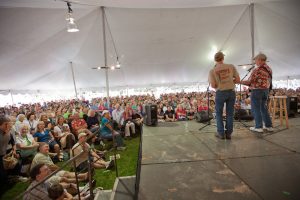 When you visit the Timpanogos Storytelling Festival, you hear from all walks of life, and, despite their differences, their stories all ring with one single truth.
When you visit the Timpanogos Storytelling Festival, you hear from all walks of life, and, despite their differences, their stories all ring with one single truth.
We are one.
True stories that leave the audience in tears—both from laughter and from strong, sentimental emotions (many times within a minute of each other)—provide a connection with the storyteller as well as the other members of the audience.
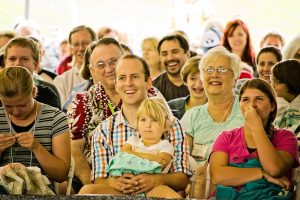

Listening together, we come together.
As mentioned in another post, you already love storytelling. In fact, you’re a storyteller yourself! Storytelling is ingrained in who you are. It makes you human. So if you haven’t participated in the quintessential event that belongs to the human race, now’s the time.
Ask anyone who has been to the Timpanogos Storytelling Festival, and they will tell you of the marvelous stories that uplift the soul and enlighten the mind. They will attest to leaving the festival enriched. Storytelling like this doesn’t come around as often as we would like. But it’s here now, so take a chance and come see for yourself why the Timpanogos Storytelling Festival is one of the nation’s premier storytelling events.
See you there!
The Timpanogos Storytelling Festival is this weekend, September 6-8 at the Ashton Gardens at Thanksgiving Point in Lehi, Utah. Get your tickets at ihttps://timpfest.org/
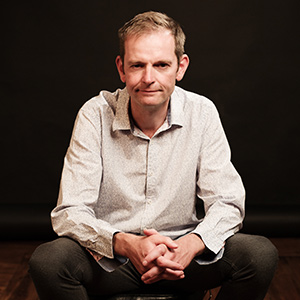
by Kim McCloskey | Sep 1, 2018 | About Storytelling, Featured, Festival
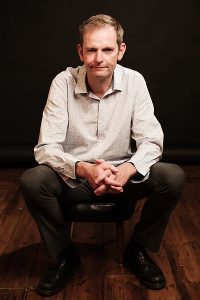 Daniel Morden respects the power of a great story, stories that have stood the test of time, sifted through generations of tellers until the words and message have been polished smooth. When I listen to his Welsh accent carefully crafting tales I fall in love with words all over again. From Greek and Celtic myths to Jack stories to Welsh folktales, Daniel explores it all. He lights up dark places so we can peer into the corners.
Daniel Morden respects the power of a great story, stories that have stood the test of time, sifted through generations of tellers until the words and message have been polished smooth. When I listen to his Welsh accent carefully crafting tales I fall in love with words all over again. From Greek and Celtic myths to Jack stories to Welsh folktales, Daniel explores it all. He lights up dark places so we can peer into the corners.
Get to know him a little better by reading his answers to our five questions.
1. At TimpFest we are very family oriented, will you tell us a little about your family?
I live in Wales with my wife Marion and our two sons, Benjamin (11) and Joseph (9). The boys are both soccer mad. As long as they have a patch of grass where they can kick a ball, they are happy. We have a story club in our home, where adults and children share traditional stories. My eldest son won a contest for his storytelling last year. The boys love festivals. Ben likes discovering new acts. Joe likes discovering new food!
2. If you weren’t a professional storyteller, what would you be doing instead?
Probably a teacher. As my sons grow up, I realise what an important and rewarding job it is. Their teachers have had an enormous influence on them.3. Do you get nervous when you tell stories on stage? If so, what do you do to overcome your fear? If not, what is the key to your fearlessness? I get nervous, particularly in front of thousands of people. What do I do? – I trust the stories. I am just a conduit for a tale that has charmed, chilled, or thrilled audiences for hundreds-sometimes thousands- of years. If I can get out of my own way then the story will work its magic. And just before I go onstage I think of the most inspired teller I ever saw, Brother Blue. He was an extraordinary performer, consumed by delight in words and ideas. I remember his passion and try to copy it.
3. Do you get nervous when you tell stories on stage? If so, what do you do to overcome your fear? If not, what is the key to your fearlessness?
I get nervous, particularly in front of thousands of people. What do I do?- I trust the stories. I am just a conduit for a tale that has charmed, chilled or thrilled audiences for hundreds-sometimes thousands-of years. If I can get out of my own way then the story will work its magic.
4. What is the most embarrassing thing that you have done or has happened to you on stage?

I got the hiccups once….’Once upon a (hic) time….’
And a bonus question: How did you get your start in storytelling?
My Dad read to me and my brother when we were children. I remember him sitting at the end of my bed, I remember the sound of his voice. His words became pictures in my head. We went to Middle Earth, the wild west, Asgard, WW2 Poland: many extraordinary places. A wardrobe wasn’t the portal that took me to Narnia, or a beanstalk to the land of a giant. It was a voice. Every time I tell a story I am attempting to reproduce that experience for the audience. To give them what I had.
You can catch Daniel at the 2018 Timpanogos Storytelling Festival on September 6-8 (that’s next weekend!) at the Ashton Gardens at Thanksgiving Point in Lehi. Utah. For tickets, click here https://timpfest.org/
Listen to a podcast of Daniel Morden at a telling at the National Storytelling Festival in Jonesborough at http://www.9thstory.com/tatterhood/
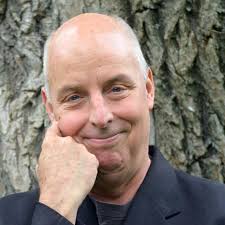
by Kim McCloskey | Sep 1, 2018 | About Storytelling
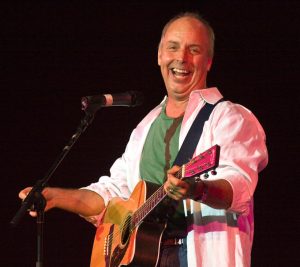 Bill Harley is more than just a storyteller. He’s a two-time Grammy award-winning artist, musician, author, playwright, and, yes, a storyteller too. His weapon of choice is humor (don’t worry, it’s a weapon for good), and with a knack for engaging both the young and the old, Bill is one teller you won’t want to miss at the Timpanogos Storytelling Festival.
Bill Harley is more than just a storyteller. He’s a two-time Grammy award-winning artist, musician, author, playwright, and, yes, a storyteller too. His weapon of choice is humor (don’t worry, it’s a weapon for good), and with a knack for engaging both the young and the old, Bill is one teller you won’t want to miss at the Timpanogos Storytelling Festival.
We reached out to Bill and asked him some questions in regards to storytelling and other things of interest to him. While a comedian in the recording studio, his down-to-earth approach on life encapsulates both wit and wisdom, and we’re happy to be able to share his thoughts with you in this post, which will help you get to know him better before seeing him at the festival. (Our questions are in italics, and his answers are in regular font type.)
Without further ado, we present to you Bill Harley (cue applause).
Q&A with Bill Harley
Our theme this year is “Pathway to Story.” How would you describe your pathway to becoming a storyteller. Was it a road, a back alley, a fast track, or a meandering trail?
It’s a road I’ve travelled for my whole adult life. After college I had a notion about being a storyteller—not really aware that others were doing it—but I soon found them. The real challenge, the real path, is finding your own voice—the kind of stories and the way you tell them—and what you bring to them. That never ends, although you do begin to understand what your possibilities are.
Could you tell us about someone who has influenced you on this journey as a storyteller?
SO many people—many of my peers in the storytelling community—I’ve learned from all of them, but also people I heard in my youth like Stan Freberg, Jean Shepherd, Bill Cosby (hard to say that now, but it’s true), and also musicians who also talked, like Arlo Guthrie, Utah Phillips, Steve Goodman, Rosalie Sorrells, and especially Pete Seeger. Pete’s probably my biggest influence.
What are you passionate about outside of storytelling?
Well, music, too. Biking, swimming, and softball. Reading. Beekeeping. Being outside. And also, working to make the world a safer, kinder place.
Where does storytelling go from here? How do you see it’s influence on society?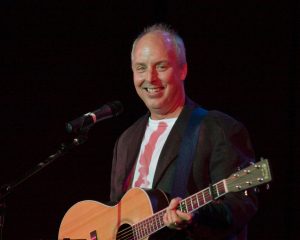
I don’t think storytelling is ever going to be HUGE. It’s just part of what people do. I’m particularly interested in storytelling that involves a teller and the people in front of her. Something happens there that doesn’t happen when it’s expressed through other mediums, and I think it’s what the storytelling community should focus on fostering—not digital storytelling, or other platforms. They will take care of themselves. My concern is how we foster excellence in the live performance of it.
http://www.billharley.com/
Thanks Bill! Come see him live at this year’s Timpanogos Storytelling Festival on September 6-8 at the Ashton Gardens at Thanksgiving Point in Lehi, Utah.
Click here to order your tickets now! https://timpfest.org/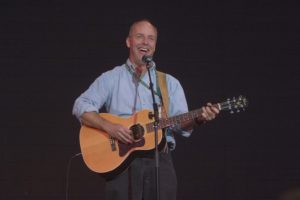

by Kim McCloskey | Aug 28, 2018 | About Storytelling
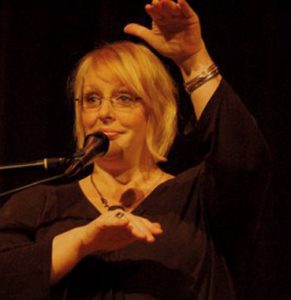 Kim Weitkamp is a crowd favorite at the Timpanogos Storytelling Festival for good reason. She peppers her stories with humor, tall tales, music, and wisdom. Not only is Kim an award winning storyteller, author, and speaker, but she also owns a design company, a record label, and has been involved in humanitarian work for the old and young alike. Talk about a busy woman! Well, we certainly appreciate Kim for taking the time to answer a few questions and guide us along her pathway to story.
Kim Weitkamp is a crowd favorite at the Timpanogos Storytelling Festival for good reason. She peppers her stories with humor, tall tales, music, and wisdom. Not only is Kim an award winning storyteller, author, and speaker, but she also owns a design company, a record label, and has been involved in humanitarian work for the old and young alike. Talk about a busy woman! Well, we certainly appreciate Kim for taking the time to answer a few questions and guide us along her pathway to story.
1. Our theme this year is “Pathways to Story.” How would you describe your pathway to becoming a storyteller? Was it a road, a back alley, a fast track, or a meandering trail?
To the general observer it probably looked fast because in the world of storytelling at festivals, it came to me pretty quick (but with a ton of work), but I had been moving and working with storytelling for years before I entered the festival circuit. I used applied storytelling in my work as a non-profit director and in my work with youth.
2. Could you tell us about someone who has influenced you on this journey as a storyteller?I experienced some pretty magical moments with Megan Hicks, Jay Callahan and David Novak. They were some of the first professional storytellers I ever saw. But my roots are deep in the soil of the books I read as a kid. I had a fairy tale collection book from Readers Digest and I am not kidding when I say I wore the binding out.3. What are you passionate about outside of storytelling?
Using story to heal and bring people together, strengthening families/communities or making creating a new community. I own a maker-space and yarn shop called The Makery. I opened it not just because of my love of handmade things, but also to carve out a corner where people feel loved and safe and where stories can be shared while we sit side by side creating. It is a very, very powerful thing and it has been more rewarding than what I had imagined.
4. Where does storytelling go from here? How do you see its influence on society?
Stories have been influencing story since the first hieroglyphics were scratched onto a cave wall. The vehicle that story uses and/or the way stories are shared may change on and off, but humans will never stop sharing stories face to face. State of the art will never replace state of the heart. It is too much a part of who we are as humans. There is a huge buzz in business about storytelling and it is creating awareness at many levels to the power of story. I am grateful for that. I think there will be an ongoing cycle where a revival of storytelling rises up and then ebbs and then rises again. It is the basic circle of us always coming back to our roots. But hey, what do I know.
5. What fictional place would you most like to visit?
The Shire.
***************************************************************************************************
Thanks, Kim, for taking the time to answer our questions. Don’t miss her at the 2018 Timpanogos Storytelling Festival on September 6-8 at the Ashton Gardens at Thanksgiving Point in Lehi, UT. Purchase your tickets at timpfest.org.
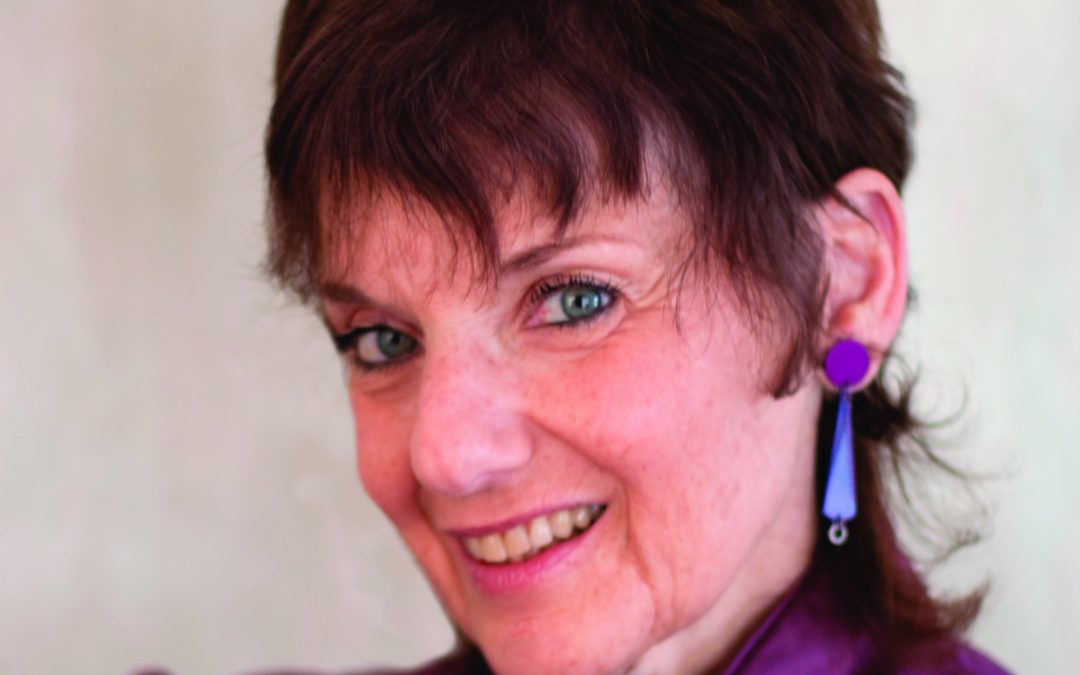
by Kim McCloskey | Aug 27, 2018 | About Storytelling
To listen to Corinn e Stavish is to walk with her along the path of carefully curated stories from the boroughs of New York City to her life in the midwest. As a fellow traveller I am reminded of my own journey and the beautiful people who have helped me along the way. Her biblical tales transport me along another path of introspection and growth. Corinne is a gifted performer and teacher, so we are excited that she will be one of our featured tellers at this year’s Timpanogos Storytelling Festival. We asked her if she would share her pathway to story with us.
e Stavish is to walk with her along the path of carefully curated stories from the boroughs of New York City to her life in the midwest. As a fellow traveller I am reminded of my own journey and the beautiful people who have helped me along the way. Her biblical tales transport me along another path of introspection and growth. Corinne is a gifted performer and teacher, so we are excited that she will be one of our featured tellers at this year’s Timpanogos Storytelling Festival. We asked her if she would share her pathway to story with us.
Our theme this year is “Pathways to Story.” How would you describe your pathway to becoming a storyteller? Was it a road, a back alley, a fast track, or a meandering trail?
My storytelling path was jagged and winding, without a steady course for many years. I had been a double major in Theatre and English in college and was a high school English and Drama teacher in Chicago. I heard my first storyteller in my synagogue in Evanston, IL and realized it was the perfect marriage of my passions. It took a few years to get started, but when I did, the road straightened; the destination became clear.
Could you tell us about someone who has influenced you on this journey as a storyteller?
Robin Goldberg was the storyteller I heard that transformative evening at my synagogue. I attended a couple of her workshops and then began to look for more opportunities to hear storytellers. It took another decade for me to attend my first storytelling festival in Jonesborough, where I lost my breath and speech…temporarily.
What are you passionate about outside of storytelling?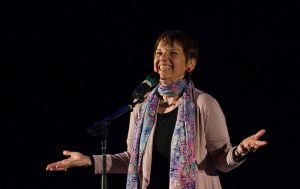
My greatest passion is traveling with my kids. I love to see the world through their eyes and experiences. I’m passionate about theatre and subscribe to a few play series. My fondest trips have been to the Shakespeare Festival in Stratford, Ontario and NYC for theatre with my kids.
Where does storytelling go from here? How do you see its influence on society?
Hopefully, storytelling will continue to be a community experience where we share our human similarities and learn about our differences. Storytelling cannot “save the world,” but our stories can add to its grace and wisdom.
What fictional place would you most like to visit?
I’d like to hang out on a raft with Huck and Jim.
***************************************************************************************************
To find your own pathway to story come and be transported with Corinne at the 2018 Timpanogos Storytelling Festival on September 6-8 at the Ashton Gardens at Thanksgiving Point in Lehi, Utah. Tickets are available at timpfest.org.

 The Quintessential Event of the Human Race
The Quintessential Event of the Human Race
 When you visit the Timpanogos Storytelling Festival, you hear from all walks of life, and, despite their differences, their stories all ring with one single truth.
When you visit the Timpanogos Storytelling Festival, you hear from all walks of life, and, despite their differences, their stories all ring with one single truth.












